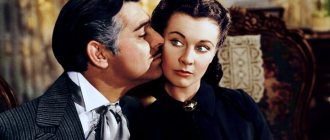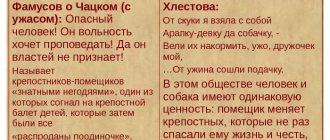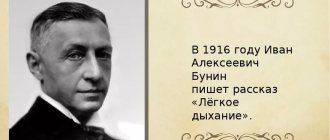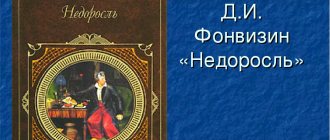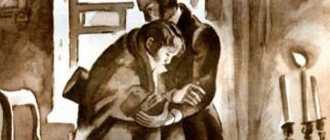Independent life
The boy leaves his family. He is settled in the regional center with Aunt Nadya. The mother really wants the child to receive an education. Here begins a difficult life, which the author characterizes as independent. It can be characterized by the following quotes:
- “...went to fifth grade...”;
- “...longing came upon me - longing for home...”;
- “...didn’t get along with any of the guys...”;
- “...they beat me one by one...”;
- “...I learned there, I will learn here too...;
The quotation plan “French Lessons” helps to form an impression of the main character. Persistence and confidence in success conquers. The boy develops his character, becoming a mature and wise young man before the reader’s eyes. He knows how to distinguish the line between good and evil, and does not take the side of immorality and dishonesty. That is why fate sends him people who are ready to help him.
“French Lessons” - a reader's diary based on a story by V. Rasputin
The story “French Lessons” by writer Valentin Rasputin was first published in 1973.
Description of the book for the reader's diary
Author:
Rasputin Valentin Grigorievich
Title of the work:
French lessons
Genre:
story
Year of writing:
1973
Publisher:
Astrel
Year of publication:
2010
The main characters and their brief characteristics
The main character, the narrator , is an eleven-year-old boy from a poor peasant family, honest, decent, decisive, very smart. Lidia Mikhailovna is a French teacher, a young woman, kind, sympathetic, sensitive. Vasily Andreevich is the school director, important, strict and demanding. Vadik is a seventh grader, cruel, unfair, a leader among his peers and younger children. Mom is a simple hard-working woman, kind and compassionate.
Time and place of the plot
The story takes place in 1948 - a difficult post-war time, when the whole country experienced deprivation and hunger. The location is one of the regional centers of the Irkutsk region. The work is autobiographical, and the events in the story took place in the real life of the writer, who was grateful to the teacher who taught him a “lesson of kindness.”
Summary and plot
In 1948, the main character was supposed to go to fifth grade. In his village he had the reputation of being literate, and the school curriculum was easy for him. Fellow villagers advised the mother to send her intelligent son to school in the regional center, which was located fifty kilometers from the village. The mother agreed and sent her son to live with her friend.
The hero quickly got used to the new class and began to study well. The only problems were with the French language, especially with pronunciation.
Soon the boy found himself in a dubious company, where the guys played “chika” for money. The mother sent the hero 50 kopecks so that he would drink milk. However, this was not enough, and the hero began to play with this money and often win. Noticing this, Vadik, the most important person in the company, began to cheat. The hero caught him in a lie, for which he was severely beaten.
Seeing the bruises on the boy’s face, Lydia Mikhailovna left him after class and asked him about his life. That's how she found out that he came from a poor peasant family, and because of a constant feeling of hunger, he was forced to gamble for money. The boy was very afraid that the teacher would tell Vasily Andreevich everything and he would be expelled from school, but everything turned out differently. Lydia Mikhailovna ordered me to come to her home after school to study French additionally.
After a while, the hero received a parcel with hematogen, sugar and pasta. He immediately realized whose hand it was and returned the food to Lydia Mikhailovna. The teacher felt sorry for the boy with all her heart, but he would have been too proud to accept help.
Then Lidia Mikhailovna invited her student to play “measuring” - a game with coins that had to be thrown against the wall in a special way. The boy considered it a fair competition, while the teacher tried her best to cheat in his favor. One day, during a game, they began to argue so loudly that Vasily Andreevich, who lived next door, came to their voices. Having learned that the teacher was playing with a student for money, he immediately fired her.
Lidia Mikhailovna went to her home in Kuban, and after a while the boy received a parcel with pasta and red
A very brief summary for a reader's diary
The boy came to the regional center to attend fifth grade. It was a hungry time and the boy began to play chica for money. The boy was beaten because he constantly won. The teacher decided to teach the boy at home. She invited the boy to play wall games with her for money. The principal found the players and the teacher left.
Retelling plan
- To the regional center to study
- Difficulties with French
- Food theft
- Hungry time
- Chica game
- Boy's success
- The boy is being beaten
- Tishkin's snitching
- Ruble for milk
- Back in the game
- Beaten again
- Home lessons
- Parcel with pasta
- Wall game
- Director's appearance
- Parcel with apples
Main thought
Kindness, humanity and compassion are the most valuable qualities in a person.
What does it teach
The story teaches you to be honest, kind, and sympathetic. Teaches you to help other people and not be shy about accepting such help. Teaches you to be a real person, teaches you to retain the best qualities in your soul, despite all the difficulties. Teaches you to show empathy. Teaches you to overcome difficulties, teaches you to work hard and study. Teaches that success is always the result of hard work.
Review and what you liked
I really liked this story and especially the teacher Lidia Mikhailovna, who showed great kindness and tried as best she could to help and support the hungry boy. She was smart and resourceful, and despite the fact that the boy refused help, she was able to do it her way. It is a pity that the director turned out to be so callous that he did not understand what exactly Lydia Mikhailovna was doing for her students.
Conclusion and my opinion
The personification of all the virtues in the work was a young teacher who, without a shadow of a doubt, neglected all the rules of decency and helped a lonely starving boy. Her noble deed left a deep imprint on the soul of the child, who, no doubt, will grow up to be a decent person.
Proverbs
- A good deed praises itself.
- Having done good, do not repent.
- The world is not without good people.
- Stick to the good and avoid the bad.
- When you're hungry, bread crust is sweeter than pie.
Quotes from the text
“...It’s strange: why do we, just like before our parents, always feel guilty before our teachers? And not for what happened at school - no, but for what happened to us after..." "...A person grows old not when he reaches old age, but when he ceases to be a child..." "...I don’t know, like in mathematics, but in life the best proof by contradiction..." "...When something doesn't work out, you will do everything to make it work, you won't give up so easily..." "...Playing for money cannot be replaced by anything else. This makes her good and bad at the same time..."
Dictionary of new and unfamiliar words
Apartment - rent an apartment. A lorry is a truck with a carrying capacity of 1.5 tons. A tea room is a type of public canteen where visitors are offered tea and snacks. Naked boiling water is clean, without impurities. To blather - to chat, talk. Hiding is something that is hidden. A literate person is a literate person. Bredni is a small fishing net that people wading through shallow water pull behind them. A collective farm is an enterprise created for collective farming.
The main character of the story
The boy strives to justify the trust of his mother, who sent him to heaven.
The boy distinguished himself with his knowledge already in the village. He wanted to read and was already beginning to feel the possibility of writing in himself: “... in the village he admitted to being a literate person: he wrote for old women and read letters, went through all the books that ended up in our unprepossessing library, and in the evenings he told all sorts of stories from them to the children, moreover adding on my own.” The student was brought up in the traditions of the Russian people. He respects and is a little afraid of the teacher. The child has no idea that a teacher can selflessly help; for him, these are people from another, more complex adult world. The hungry boy turns to stone in Lidia Mikhailovna’s apartment: “...Already naturally timid and shy, lost at every trifle, in this clean, neat apartment of the teacher at first I literally turned to stone and was afraid to breathe.” From fear, the boy lost all his feelings, even the most difficult to hide - hunger: “It’s a shame to remember now how scared and confused I was when Lidia Mikhailovna, having finished our lesson, called me to dinner. If I were hungry a thousand times, all appetite would immediately jump out of me like a bullet.”
Philosophical judgments
Rasputin invites readers to begin reasoning with him on problems that lie outside the plot, but explain it. Quotes from the text combine events into one whole and give an understanding of the author’s position about the hero of the story.
The appearance in life of scoundrels, careerists, flatterers and sycophants: “...How was I to know that no one has ever been forgiven if he gets ahead in his business?
Then do not expect mercy, do not seek intercession, for others he is an upstart, and the one who hates him most is the one who follows him...”
A person’s dangerous desire to trust people: “...I spoke sincerely, but what can we do if our sincerity cannot be tied with ropes...”.
The eternal problem of fathers and children: “...A person grows old not when he reaches old age, but when he ceases to be a child...”.
The most important law of life is to go from negative to positive, not to allow evil: “...I don’t know how it is in mathematics, but in life the best proof is by contradiction...”.
Drawing up a story plan is necessary to understand the sequence of events. The author’s words characterize the heroes of the work more clearly than his own reasoning based on emotions.
It will become easier to write an essay “Quotation plan for the story “French Lessons” using the proposed excerpts of the work; quotes will fill in information on various topics.
Quotes From French Lessons
"French lessons"
— a story by Valentin Rasputin in 1973. Was filmed in 1978.
A person grows old not when he reaches old age, but when he ceases to be a child.
I spoke sincerely, but what can you do if our sincerity cannot be tied with ropes.
How was I supposed to know that no one has ever been forgiven if he gets ahead in his business, and the one who hates him most is the one who follows him.
At the same time, there was no cruelty in her face, which, as I later noticed, over the years becomes almost a professional characteristic of teachers, even the kindest and gentlest.
I remained alone, not understanding and not distinguishing loneliness from my bitter situation.
For a teacher, perhaps the most important thing is not to take himself seriously, to understand that he can teach very little.
— You sent this parcel to the school. I know you. I noticed that Lydia Mikhailovna blushed and was embarrassed. This was obviously the only time when I was not afraid to look her straight in the eyes. I didn’t care if she was a teacher or my second cousin. Here I asked, not she, and asked not in French, but in Russian, without any articles. Let him answer. - Why did you decide it was me? — Because we don’t have any pasta there. And there is no hematogen. - How! Doesn't happen at all?! “She was so sincerely amazed that she gave herself away completely.” - It doesn’t happen at all. I had to know. Lidia Mikhailovna suddenly laughed and tried to hug me, but I pulled away. from her. “Really, I should have known.” How can I do this?! “She thought for a moment. - But it was difficult to guess - honestly! I'm a city person. You say it doesn’t happen at all? What happens to you then? - There are peas. Radish happens.
I don’t know about mathematics, but in life the best proof is by contradiction. When the next day I saw that Lydia Mikhailovna, in order to touch the coin, was secretly pushing it towards her finger, I was stunned. Looking at me and for some reason not noticing that I could clearly see her pure fraud, she continued to move the coin as if nothing had happened. - What are you doing? - I was indignant. - I? And what am I doing? - Why did you move it? “No, she was lying here,” Lydia Mikhailovna answered in the most shameless manner, with some kind of joy, no worse than Vadik or Ptah. Wow! It's called a teacher! With my own eyes, at a distance of twenty centimeters, I saw that she was touching the coin, but she assures me that she did not touch it, and even laughs at me. Is she taking me for a blind man? For the little one? She teaches French, it's called. I immediately completely forgot that just yesterday Lydia Mikhailovna tried to play along with me, and I only made sure that she did not deceive me. Well well! Lidia Mikhailovna, it's called.
useful links
Check out what else we have:
- for the most impatient - A very brief summary of “French Lessons”
- for the most sociable - The main characters of “French Lessons”
- for the busiest – Reader’s diary “French Lessons”
- for the most curious - Analysis of “French Lessons” Rasputin
Work test
- Question 1 of 11

